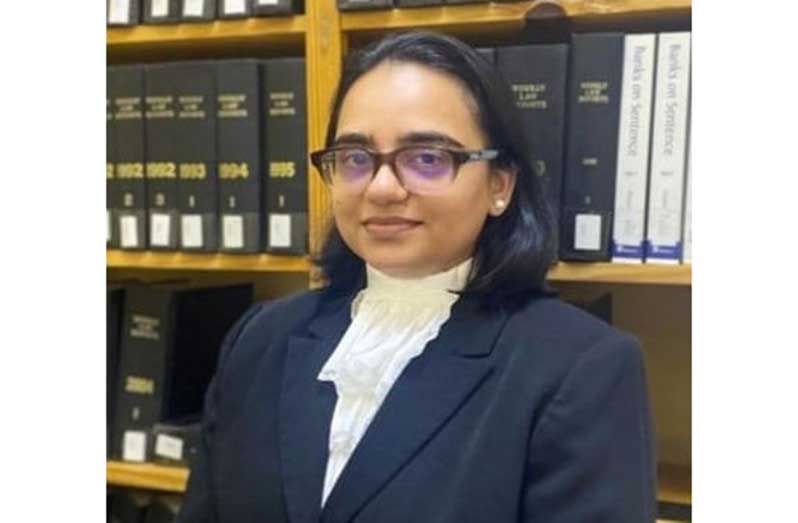A 24-year-old man was on Tuesday sentenced to 12 years’ imprisonment following a fatal stabbing at Friendship, East Bank Demerara (EBD) in December 2021.
Zibeon Williams had earlier entered a guilty plea to a manslaughter charge for the December 2021 killing of Joshua Ferdinand, at the High Court in Georgetown.
Justice Zamilla Ally-Seepaul imposed the prison term.

Initially charged with the capital offence of murder, Williams chose to enter a guilty plea to the lesser charge of manslaughter.
He acknowledged that on December 20, 2021, he had unlawfully killed Ferdinand. At around 20:30 hours on the day in question, Williams was imbibing at a shop located at Parcel 310 Friendship when an argument broke out between him and the aunt of the deceased. Joshua, who was 23 at the time, stepped in during the heated argument and shoved Williams into a nearby trench. According to reports, Williams emerged from the trench, brandished a knife, and stabbed Ferdinand twice—once in the neck and once in the abdomen. After being taken to the Diamond Hospital at Diamond, EBD, Ferdinand was declared dead on arrival.
The presiding judge provided a detailed sentencing opinion on Tuesday, referencing criminal case law to explain how she determined an appropriate punishment for the convict, taking into account both aggravating and mitigating considerations as well as the goals of sentencing.
She listed several aggravating factors, such as Williams’ use of a knife, the fact that Ferdinand was attacked by Williams while he was unarmed and posed no threat to him, the deceased’s youthful age, the fact that the killing was an act of retaliation, and the fact that Ferdinand was the one who initiated the aggression.
The judge stated that, given Ferdinand’s age at the time of his passing, he had his “entire future ahead of him” in terms of personal and professional development. Considering the aforementioned, Justice Ally-Seepaul determined a starting point of 25 years was fitting, from which she subtracted three years for relevant mitigating factors pertaining to the offender. These factors included the offender’s prior clean criminal record, his positive probation report, his youth and genuine interest shown in being reformed, his sincere display of regret, as well as his early guilty plea. In addition, Williams’ early guilty plea resulted in a one-third sentence reduction. He was also credited for his pretrial detention time. Following these subtractions, the offender’s ultimate sentence was 12 years.
During a previous hearing, the presiding judge heard an impact statement from the mother of Ferdinand, reports from a prison welfare officer and psychiatrist, and submissions from attorneys for the defence and prosecution. The mother of the victim revealed that he was her eldest son. She described him as loving, peaceful, and incredibly supportive.
Both she and her family members were devastated by her son’s death, she testified. “This is still affecting us after all these years. This happened close to Christmas, and Christmas has never been the same for us.” She declared that she had no mercy for the person who killed her child and requested the court to punish Williams harshly for his illegal behaviour.

During the court proceedings, the prison welfare officer highlighted Williams’ good behaviour and his participation in rehabilitation programmes, such as anger management classes.
State prosecution attorney Padma Dubraj, for her part, recommended a starting sentence of 25 years given the serious nature of the crime and the prevalence of unlawful killings in society.
In doing so, she brought up the deterrence theory with the court, which holds that criminal sanctions serve as a deterrent to future offenders as well as a means of punishing those who perpetrate the crimes. Ferdinand’s death was characterised by prosecutor Dubraj as violent, gruesome, and unjustified. The post mortem revealed that Ferdinand had suffered severe injuries, she pointed out. She reminded everyone that the offender had committed the crime with a knife, a dangerous weapon, and that he had fled on foot without helping the injured man.
The other prosecutor was attorney Rbina Christmas.
Williams apologised and said he was “hurt” and “sorry” that he had killed someone while intoxicated when he was given the chance to speak to the court. The repentant man pleaded with the family of the dead man for forgiveness and requested the judge’s leniency.
Ronald Bostwick, the killer’s lawyer, stated in a mitigation plea that his client had generally shown remorse for his action. He said that by admitting guilt as soon as possible, his client had accepted responsibility for his actions and avoided the necessity of a drawn-out trial. The attorney emphasised that the evidence clearly indicated that Joshua attacked his client, who was at the time a “hopeless drunk.” Despite this, the defence attorney begged the judge to sentence his client in a way that would enable him to get out of prison and contribute to nation building.




.jpg)









